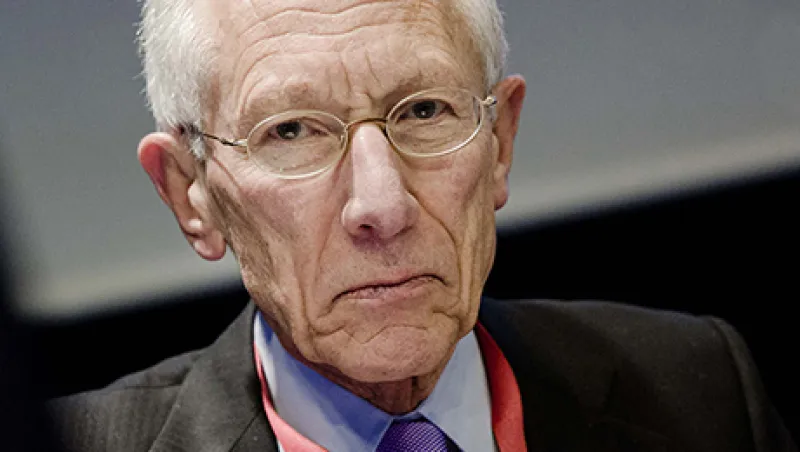Global monetary policy may be the softest on record, but for Federal Reserve vice chair Stanley Fischer there’s plenty to chew on. “At a 1 percent growth rate, it takes income 70 years to double,” Fischer said of declining U.S. productivity growth, quoting fellow Chicago School economist Herbert Stein, at this month’s National Association for Business Economics conference in Washington.
The vice chair has been an economist for roughly five decades, he pointed out in his lunchtime keynote speech, entitled “Reflections on Macroeconomics Then and Now”, which took place a week and a half before the Fed made its March 16 policy announcement. (He’s also been with his wife, Rhoda, whom he met in their Zionist group, for about the same length of time.) Fischer served as a professor, chief economist of the World Bank Group and governor of the Bank of Israel before taking his current post in 2014. He sees some parallels between the monetary policy of the 1960s and the situation today.
“Are the answers all different than they were 50 years ago? No,” said Fischer, 72, who was born in what is now Zambia and moved to the U.S. in the late 1960s to earn a Ph.D. in economics at the Massachusetts Institute of Technology. “But also, yes: Some of the answers are different because they were not on previous exams because the problems they deal with were not evident 50 years ago.”
One of those problems is how to handle unprecedentedly low interest rates. Desperate times call for desperate measures, and economic expansion since the 2008–’09 financial crisis has been tepid. Yet it’s a fear of overheating that has kept Fischer and some of his fellow Federal Open Market Committee members up at night.
In keeping with a Phillips curve macroeconomic view, now that the U.S. jobless rate has fallen to 4.9 percent, it’s time to amp up interest rates to keep price growth in check, Fischer has maintained.
“A persistent large overshot of our employment mandate would risk an undesirable rise in inflation that might require a relatively abrupt policy tightening, which could inadvertently push the economy into recession,” he told policymakers and executives in February at the IHS CERAWeek energy conference in Houston. “Monetary policy should aim to avoid such risks and keep the expansion on a sustainable track.” In other words: To contain inflation, hike early and slowly.
Fed chair Janet Yellen’s March policy announcement revealed that the FOMC’s 2016 game plan — for now, at least — is to hold rates steady at between 0.25 and 0.5 percent and to make just two increases this year, rather than the four expected a few months ago.
Inflation has indeed crept up. Core personal consumption expenditure (PCE) inflation, the Fed’s favored measure of price growth, clocked in at 1.7 percent on an annualized basis as of January. That metric excludes energy, which has seen two years of depressed prices, and food.
Yet as short of the Fed’s 2 percent target as the current inflation rate is, the central bank apparently doesn’t think even this level is sustainable. In its March announcement it lowered its 2016 core PCE forecast to 1.2 percent, from 1.6 percent in December. The Fed cited the risks that global developments such as China’s market turbulence pose to the U.S. economy, despite expectations of moderate growth stateside.
Until the next Fed meeting, anyway, a view that runs counter to Fischer’s prevails within the 12-member FOMC: Because the Phillips curve and other economic models don’t operate in a vacuum, the financial tumult abroad means that caution should take precedence. But is inflation really petering out?
“It is sometimes argued that the link between unemployment and inflation must have been broken,” Fischer said in his NABE address. “I don’t believe that.”
Follow Anne Szustek on Twitter at @the59thStBridge.
Get more on macro.






